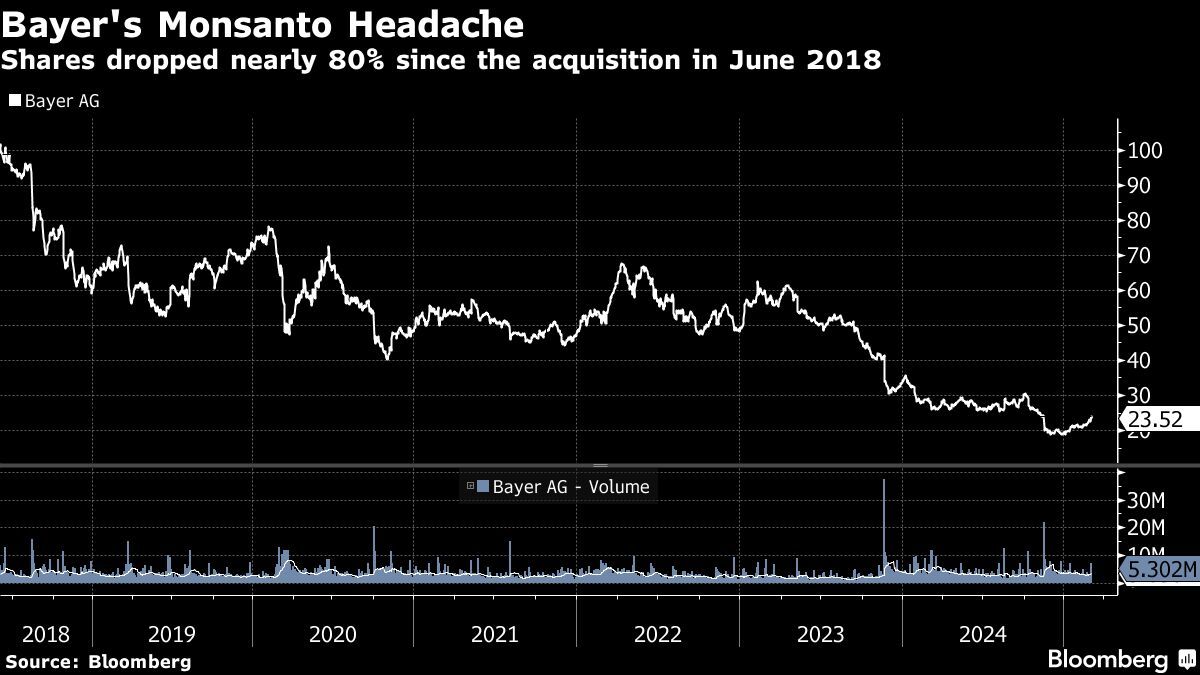
Bayer AG said on Wednesday it expects core earnings to probably fall to between €4.50 (RM21.16) and €5 a share on a currency-adjusted basis on weak prices for agriculture products and US lawsuits over the weedkiller Roundup still hanging.
(March 5): Bayer AG forecast a third straight year of falling profit as the German company struggles with mass litigation in the US, slumping prices for agriculture products and fresh competition for some of its best-selling medicines.
Core earnings will probably fall to between €4.50 (RM21.16) and €5 a share on a currency-adjusted basis, the company said in a statement on Wednesday. That’s down from €5.05 last year and compares with analysts’ average estimate of €4.61.
The outlook raises the stakes for chief executive officer Bill Anderson, who took the reins at the German conglomerate in 2023 and has been streamlining operations and seeking to resolve litigation in the US over chemicals that Bayer inherited with its US$63 billion (RM281.23 billion) takeover of Monsanto.
Bayer shares recovered from initial declines and rose as much as 3.6% as the profit guidance exceeded some estimates and German stocks rebounded from Tuesday’s steep losses. The company’s shares are still down by almost 80% since Bayer acquired Monsanto in 2018.
Last year, Anderson ruled out breaking up the company’s current structure, which includes divisions focused on agriculture, pharmaceuticals and over-the-counter medicines. He has pledged to win back the faith of investors burned by years of poor performance and a string of crises.
Calling 2025 a pivotal year, Anderson said he’s pushing through more initiatives aimed at boosting sales and profitability and the financial performance should improve in 2026 and beyond. Anderson’s operational belt-tightening efforts generated €500 million in savings last year and should deliver another €800 million of savings this year, Bayer said.
Containing legal risks
Earnings will probably reach between €9.5 billion and €10 billion this year before interest, taxes, depreciation, amortisation and special items, the company said in the statement. That’s down from €10.1 billion last year and compares with the €9.53 billion average estimate of analysts.
Bayer’s challenges are myriad. The crops division continues to suffer from low commodity prices. The pharma unit needs cancer treatment Nubeqa and kidney medicine Kerendia to keep growing strongly to counteract the sales decline of blockbuster blood thinner Xarelto, which is facing patent expiry. While the consumer health division has performed well, it’s Bayer’s smallest unit.
On the litigation front, Bayer is seeing “tangible steps towards containment on the horizon this year,” and said that it’s committed to “significantly containing” the legal risks by the end of 2026.
The company has reserved US$16 billion for US lawsuits over the weedkiller Roundup, which plaintiffs argue caused their cancer and Bayer insists is safe. It’s also already agreed to pay almost US$2 billion in settlements in cases concerning toxic PCBs brought by US states, cities and counties. More trials are looming on both fronts.
Pharma growth
The pharma division should return to growth in 2027, Bayer said, with sales of Nubeqa and Kerendia expected to reach a combined €2.5 billion this year, up from €2 billion last year.
Bayer also announced efforts to boost profitability at its crops division, where revenue shrank last year amid sluggish prices for chemicals like the weedkiller glyphosate. Anderson said that by making changes to the unit’s product portfolio, research and development, and other areas Bayer could unlock another €1 billion in earnings by 2029.
Uploaded by Felyx Teoh
- Gas pipeline blaze: Petronas Gas, Gas Malaysia’s shares open marginally lower after trading halt
- Gas pipeline blaze: MIDF flags potential RM18m impact to Petronas Gas
- T7 Global drops to two-year low, triggers short-selling halt after deputy chairman's departure
- Digital banks in Malaysia urged to re-examine strategies to better serve B40 segment
- Police to look into allegations that digging caused gas pipeline fire
- India’s Kotak targets US$2b for new private credit fund
- Trump’s bid to weaken China’s maritime heft may take ‘decades’
- China’s efforts to curb solar glut show limited impact — CEA
- Actor Val Kilmer, star of 'Top Gun' and 'Batman Forever', dies at 65 — report
- How Spain became big pharma’s new hotspot in Europe

